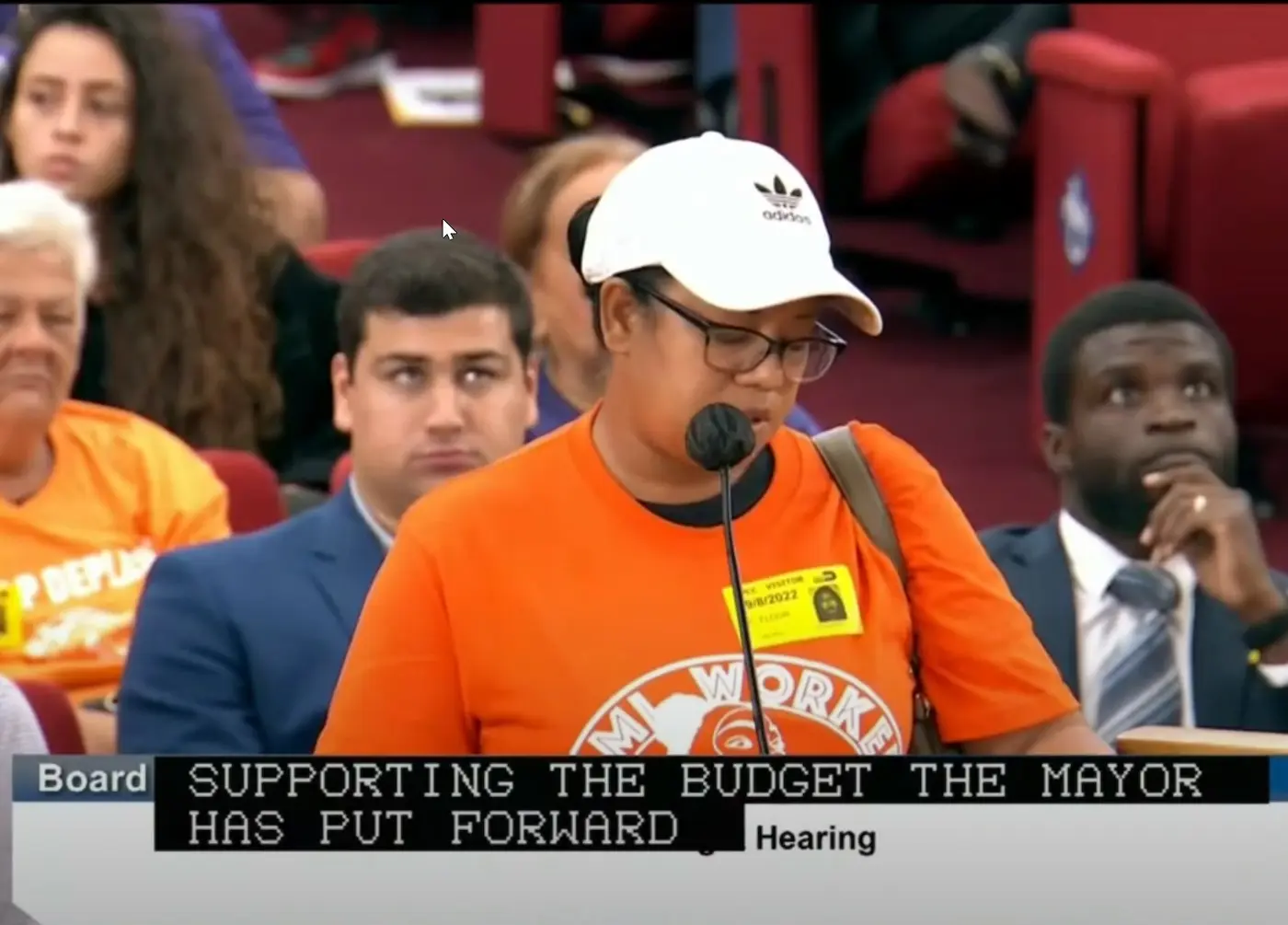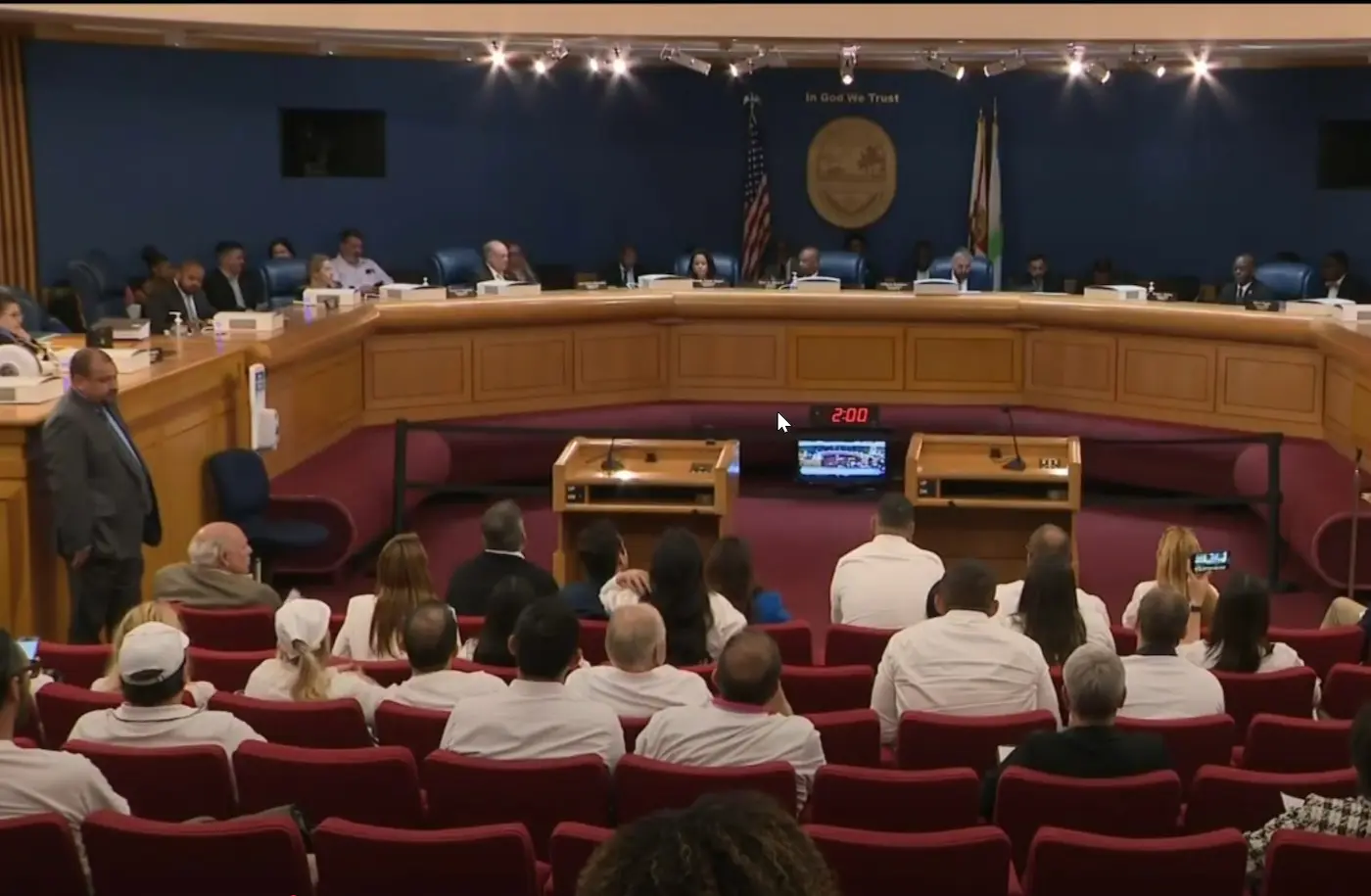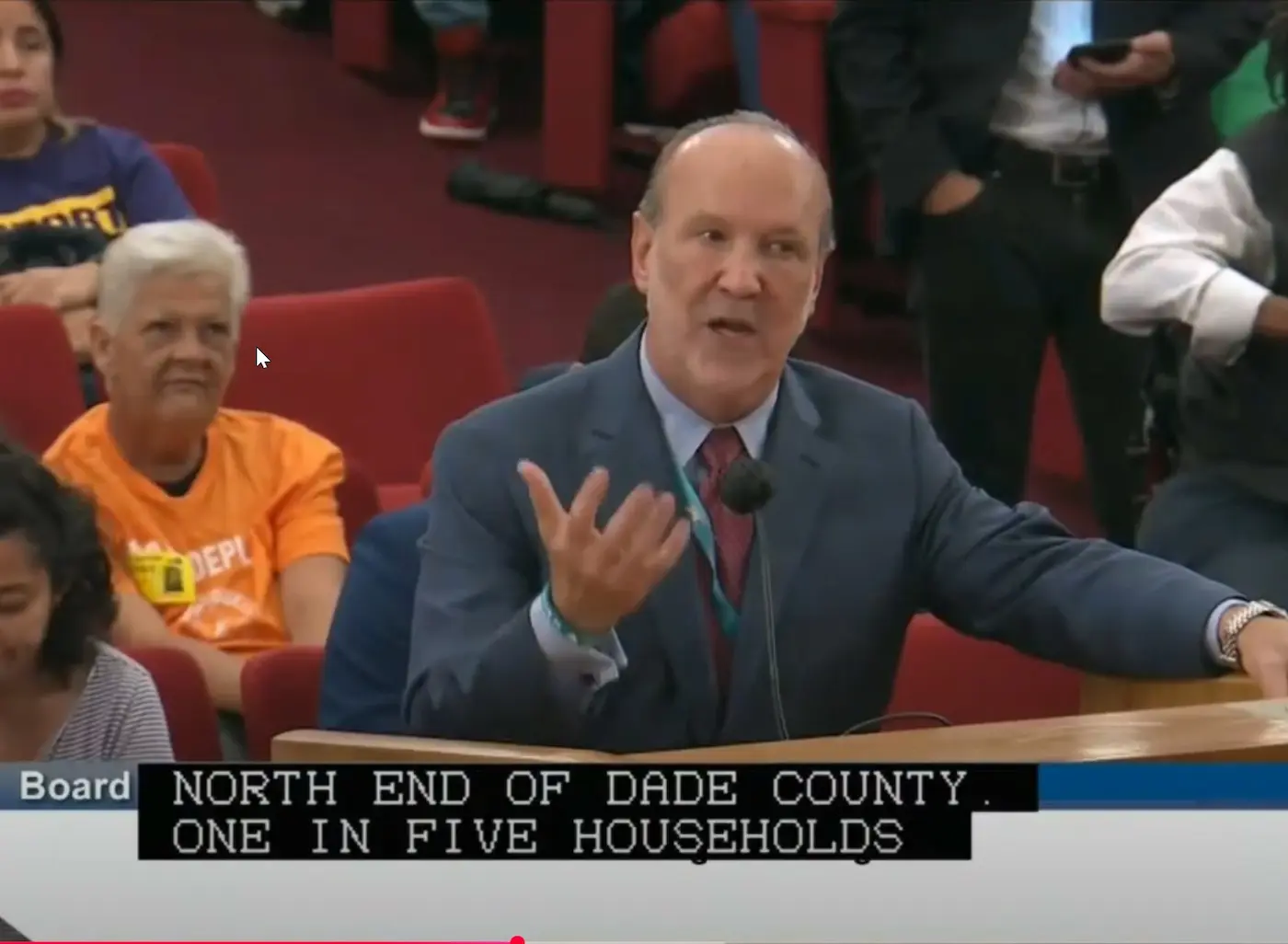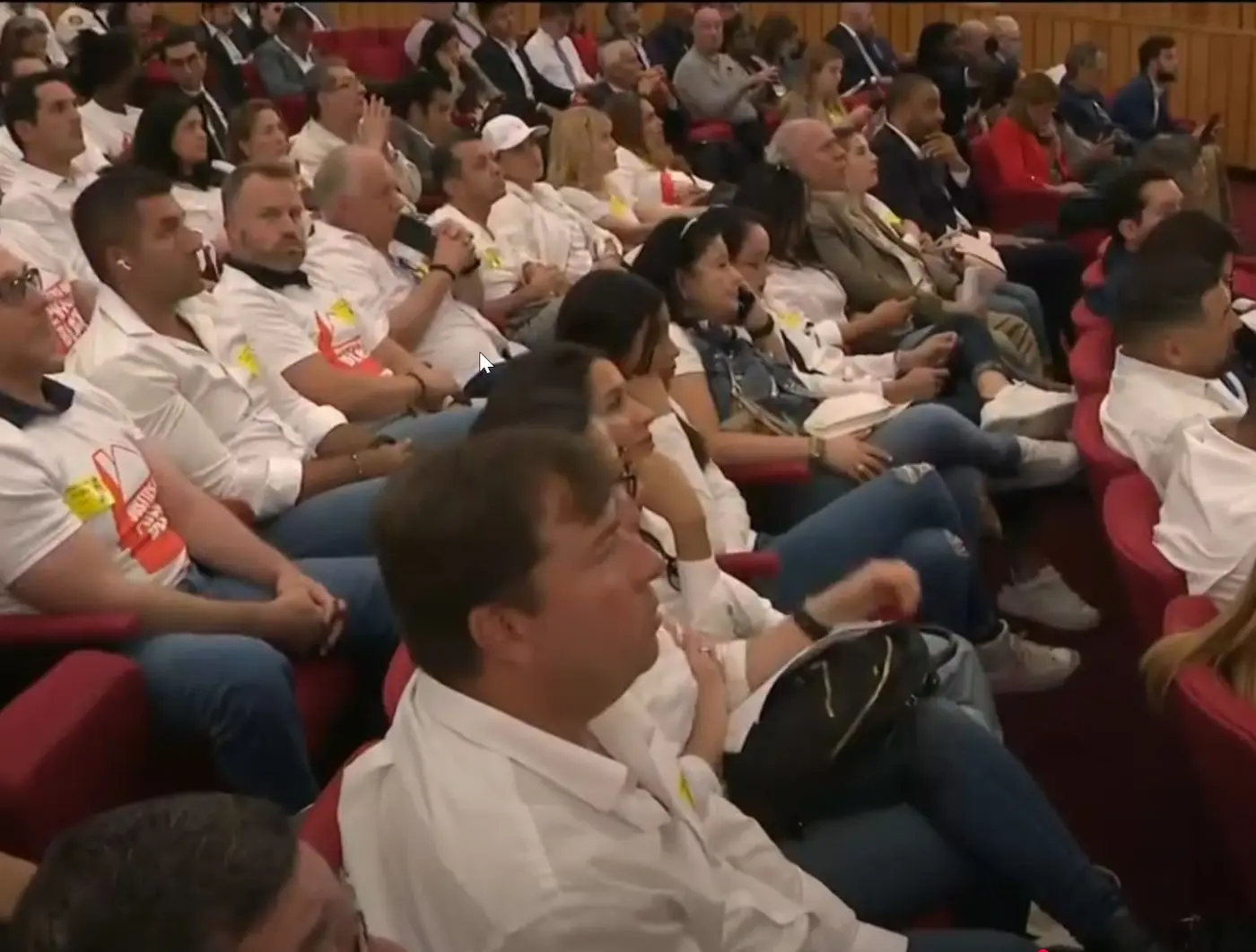|
Getting your Trinity Audio player ready... |
Tabla de Contenido/ Table of Contents
“How Much Does a Minute Weigh in Miami-Dade? The Theater of Power and the Prewritten Scripts.” Citizens have exactly one minute to try to include their voices in the script of power.
In the heart of Miami-Dade County, where the Caribbean sun blends with the bustle of a constantly evolving metropolis, stands a government building at 111 Northwest 1st Street. On its second floor, under fluorescent lights and cameras recording for posterity, a political drama unfolds monthly that could well rival the classic works of Shakespeare: the Miami-Dade County Board of Commissioners. Here, among choreographed speeches and pre-approved agendas, citizens have exactly one minute to try to include their voices in the script of power. But how much does that minute really weigh in a play where the ending already seems written?
The Stage: A Theater with Bureaucratic Curtains
Miami-Dade, founded in 1836 and named after a military officer who fell in the Seminole Wars, is today a labyrinth of 34 municipalities, 38 census-designated places, and 16 unincorporated areas. Its government, led by Mayor Daniella Levine Cava—a figure who combines the charisma of a political influencer with the shrewdness of a seasoned veteran—and 13 commissioners representing districts as diverse as Little Havana neighborhoods and Coral Gables suburbs, seems to operate under an invisible script.
Public hearings, that supposed stronghold of democracy, transform into a choreography of inefficiency: residents facing crises ranging from the tearing reality of the housing crisis to the urgency of climate change must recite their anguish before a cast of politicians who, with distracted glances, either cut them off with a “What are you going to talk about?” or demand—as a bureaucratic formality—that they state their place of residence, stealing precious seconds from that one minute that slips away like sand through their fingers.
As the clock keeps ticking, the ritual is not just about speaking but about surviving a filter of legitimacy, where even your postal address becomes a piece of data to validate your right to be heard… or to silence you. In the end, the stopwatch does not measure solutions: it is the symbol of a system that prioritizes control.

The Citizen’s Minute: Between Hope and Farce
The ritual is clear: to speak, one must register in advance, submit to questionnaires, and align with a specific point on the agenda. Then, the clock counts 60 seconds. In that fleeting moment, desperate residents try to condense years of institutional negligence, while some commissioners glance at their phones or whisper among themselves. “It’s a Dantean scene,” says one participant. “You realize that neither in a minute nor in a hundred can you break through the fourth wall of this theater. The script has already been decided backstage.”
And indeed, behind the scenes, agreements are often forged long before the curtain rises. Critical votes—on multimillion-dollar budgets or infrastructure projects—are rarely decided on the floor, but rather in private meetings or through alliances woven among ‘actors’ who have spent decades playing the same roles. Like in a Greek tragicomedy, a commissioner who once defended the homeless may, the next day, vote to cut funding for social programs—without ever losing their mask of benevolence.
The Cast: Actors Who Refuse to Leave the Stage
Miami-Dade is a stage where longevity takes precedence over innovation. Some commissioners, with over 20 years in office, embody characters anchored in a past that no longer exists. Their performances—seemingly improvised but carefully calculated—reflect a system that rewards loyalty to old power networks over efficiency. “It’s like watching Othello turn into Medea overnight,” quips a political journalist. “They change their discourse with the wind, but they never lose their footing: they know how to move the pieces to stay in the game.”
Meanwhile, Mayor Daniella Levine Cava tries to balance her progressive image with the pressures of a fragmented cast. Her leadership, criticized by some as too conciliatory, clashes against walls of bureaucratic inertia. The “opening acts”—lawyers, lobbyists, career officials—work to keep the facade intact, even when the cracks are evident: from corruption in public contracts to the inability to address disasters like the Surfside building collapse.
The Audience: A Minute to Shout in an (Almost) Silent Theater
In this drama, citizens are uncomfortable spectators. Their minute at the microphone is a symbolic gesture, a nod to participation that contrasts with the reality of decisions made behind closed doors. When the “script” becomes too unpopular—such as the controversial agreement with developers in environmentally sensitive areas—public hearings become private, and the audience is expelled from the room.
But not everyone resigns to silence. Resident collectives are rewriting the script from the outside, using social media and creative protests to demand transparency. Their demand is clear: tear down the theater and build a new stage where the citizen’s minute weighs more than rehearsed speeches.
Open Ending or Another Season of the Same Play?
Miami-Dade, with its cultural diversity and economic dynamism, deserves a government that meets its needs. But for that to happen, the theater of power must be revamped: new actors, visionary directors, and a script that prioritizes solutions over spectacle.
Until then, the minute will keep ticking… and weighing less than a sigh in the humid winds of South Florida.
Will a Minute in Miami-Dade Ever Be Worth More Than a Thousand Empty Applause? The show goes on.
Author’s Note: This article does not seek to delegitimize the work of committed officials but rather to reflect on a system that, like many in the U.S., struggles to reconcile participatory democracy with deeply rooted power structures. The theater is, in the end, just a metaphor… or maybe not.
The Last Word Is Yours, Miami-Dade!
Did you know that this county belongs to you? Behind the speeches, the agendas, and the timed microphones, real power beats in the streets, in your hands. We residents are not mere spectators in someone else’s theater—we are the owners of the script. Don’t let them sell you the lie that the decisions have already been written.
Participate, demand, take up space. Attend hearings, vote consciously, organize with your neighbors, and raise your voice even when they tell you that you ‘only have a minute.’
Bureaucracy wants you to believe that your role is to stay silent. Don’t accept it! Every uncomfortable question, every grassroots proposal, every petition signature is a brick that dismantles the wall of the status quo.
If you don’t raise your hand, others will decide for you… and Miami-Dade’s future will remain hijacked behind closed doors.
You are the author of this story.
Don’t let anyone write the ending for you.
Act now!
#PowerToThePeople #MiamiDadeWontBackDown
Want more post like this?
Head over to our homepage for the latest updates from South Florida and beyond:












